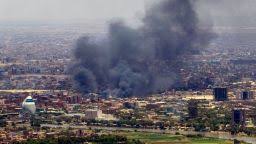“Explore the significance of the Saudi-US announced ceasefire in Sudan, its implications, and the challenges to achieving lasting peace.”
In a much-needed development, Saudi Arabia and the United States have jointly declared a 24-hour ceasefire between the Sudanese Armed Forces and the Rapid Support Forces. The announcement comes amidst weeks of intense fighting in Sudan, which has hindered the country’s transition to civilian rule and led to widespread humanitarian concerns. This blog explores the significance of the ceasefire, its implications for the Sudanese people, the role of international actors, and the challenges that lie ahead in achieving a lasting peace in the region.
All in one trendz: Discover the national and international news
The Need for Ceasefire and Humanitarian Aid

The decision to implement a temporary ceasefire reflects the growing frustration of both Saudi Arabia and the US over the lack of commitment to previous peace agreements in Sudan. The ongoing clashes between the Sudanese Armed Forces and the Rapid Support Forces have resulted in significant casualties and displacement of civilians. The ceasefire aims to provide a brief respite from the violence and facilitate the movement of crucial humanitarian aid throughout Sudan. This humanitarian assistance is desperately needed to address the dire conditions faced by the Sudanese people, especially women, children, and vulnerable communities.
Political Dynamics and International Involvement
The conflict in Sudan has complex political dynamics, with various factions vying for power and control. General Abdel Fattah al-Burhan, the military ruler of Sudan, and General Mohamed Hamdan Dagalo, leader of the Rapid Support Forces, have been at the forefront of the conflict. The involvement of Saudi Arabia and the United States demonstrates the international community’s recognition of the urgency to resolve the crisis in Sudan.
However, challenges persist in achieving a sustainable peace. The recent declaration of Volker Perthes, the special representative of the UN Secretary-General in Sudan, as “persona non grata” by the Sudanese government highlights the tensions and disagreements between local and international actors. The UN’s role in Sudan and the impact of Perthes’ removal from his post further complicate the path towards peace and stability.
Prospects and Obstacles to Lasting Peace
While the temporary ceasefire provides a glimmer of hope, the underlying obstacles to lasting peace in Sudan remain significant. One of the key challenges is the ethnicization of the conflict, as highlighted by Volker Perthes in his address to the UN Security Council. The deep-rooted grievances and historical divisions among Sudan’s diverse ethnic groups contribute to the perpetuation of violence and hinder the establishment of a unified and inclusive government.
Furthermore, the lack of a decisive military victory for either faction complicates the prospects for a negotiated settlement. Both the Sudanese Armed Forces and the Rapid Support Forces have demonstrated their resilience and refusal to back down, prolonging the conflict and exacerbating the suffering of the Sudanese people.

Another critical factor is the need for broader regional and international support for peace-building efforts in Sudan. While Saudi Arabia and the US have taken a step towards de-escalation, it is crucial for other regional powers, such as neighboring countries and African Union member states, to contribute to the peace process. Additionally, international organizations like the United Nations and African Union must continue to engage with all stakeholders and facilitate dialogue, reconciliation, and the restoration of democratic institutions in Sudan.
The 24-hour ceasefire announced by Saudi Arabia and the United States in collaboration with Sudanese factions is a modest yet necessary step towards peace in the country. It offers a temporary respite for humanitarian aid to reach those in need and reflects the international community’s recognition of the urgency to address the crisis. However, achieving lasting peace in Sudan requires sustained efforts, dialogue, and inclusive political processes. Regional and international actors must work collectively to support Sudan’s transition to civilian rule,address underlying grievances, and ensure a brighter and more stable future for the Sudanese people.
For more update:-All in one trendz: Discover the national and international news


